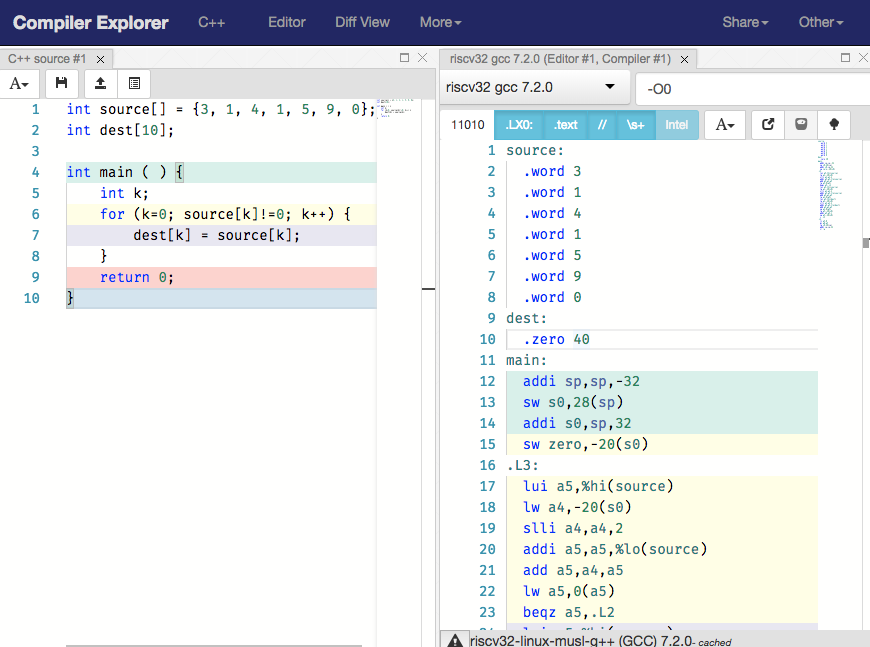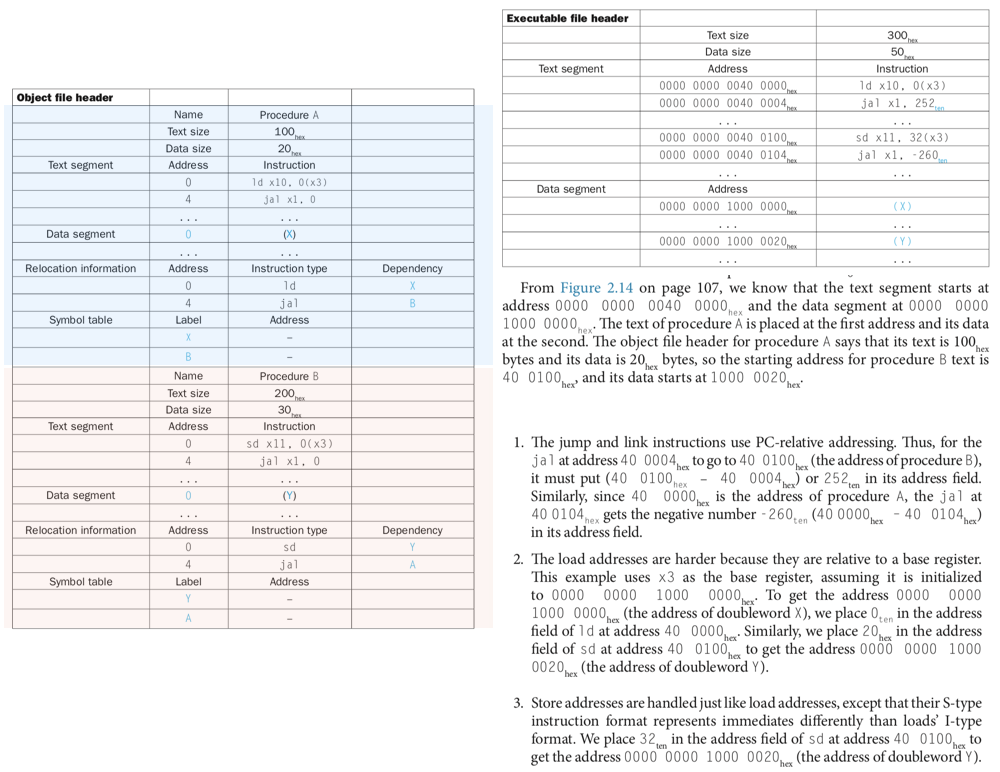Intro to RISC-V
Tools
In Lab 3, you are introduced to Venus: http://www.kvakil.me/venus/. Venus is easy to use but somewhat limited (it is meant for education anyway).
In addition to Venus, you can setup your own RISC-V toolchain to explore the compiler.
https://github.com/riscv/riscv-tools
If compiling code from source is hard for you, you can use this compiler explorer: https://cx.rv8.io/
Optimization Levels
Level 0: -O0
void x() {
}x():
addi sp,sp,-16
sw s0,12(sp)
addi s0,sp,16
nop
lw s0,12(sp)
addi sp,sp,16
jr raLevel 1/2/3: -O1, -O2, -O3.
void x() {
}x():
retSimple Functions
int double_(int x) {
return x + x;
}double_(int):
slli a0,a0,1
retdouble_(int):
add a0,a0,a0
jr raMore
Use compiler explorer.
int ultimate_question(int a0, int a1, int a2, int a3,
int a4, int a5, int a6, int a7,
int a8, int a9) {
int x = a0 + a1 + a2 + a3 + a4 + a5 + a6 + a7 + a8 + a9;
return x;
}
int main() {
return ultimate_question(0, 1, 2, 3, 4, 5, 6, 7, 8, 9);
}1. Overview
- Range using Branch (12 bits, [-2^12, 2^12 - 1] bytes, [-2^10, 2^10 - 1] instructions)
- Range using Jump (20 bits, [-2^20, 2^20 - 1] bytes, [-2^18, 2^18 - 1] instructions)
- Assembly
0x002cff00: loop: add t1, t2, t0 #R | 0 | 5 | 7 | 0 | 6 | 0x33 |
0x002cff04: jal ra, foo #J | 0 | 0x14 | 0 | 0 | 1 | 0x6F |
0x002cff08: bne t1, zero, loop #B | 1 | 0x3F | 0 | 6 | 1 | 0xC | 1 | 0x63 |
...
0x002cff2c: foo: jr ra ra=__0x002cff08___
2. Powerful RISC-V
Write assembly friendly C.
int power(int x, int n) {
int ret = 1;
for (int i = 0; i < n; i++) {
ret = ret * x;
}
return ret;
}int power(int a0 /* x */, int a1 /* n */) {
int t0 = 0;
int t1 = a0;
int a0 = 1;
while (!(t0 >= a1)) {
a0 = a0 * t1;
t0++;
}
return a0;
}power: li t0, 0 # t0 = 0
addi t1, a0, 0 # t1 = a0
addi a0, x0, 1 # a0 = 1
loop: bge t0, a1, end # end the loop if t0 >= a1 (n)
mul a0, a0, t1 # a0 = a0 * t1
addi t0, t0, 1 # t0 = t0 + 1
jal x0, loop # Jump back to the while condition
end: jr ra # Return to callerAssembler / Linker / Loader / Go
Use examples in multifiles.
.
├── Makefile
├── add.c
├── add.h
├── main.c
├── mul.c
├── mul.h
├── sub.c
└── sub.h
Makefile to change different compiler and library archiver
# CC=gcc -O0
# AR=ar
CC=/opt/riscv/toolchain/bin/riscv64-unknown-elf-gcc
AR=/opt/riscv/toolchain/bin/riscv64-unknown-elf-arExample library implementation: add
// add.h
int add(int a, int b);
// add.c
int add(int a, int b) {
return a + b;
}Main file.
// main.c
#include <stdio.h>
#include "add.h"
#include "sub.h"
#include "mul.h"
int main() {
printf("1 + 1 = %d\n", add(1, 1));
printf("2 - 1 = %d\n", sub(2, 1));
printf("2 * 1 = %d\n", mul(2, 1));
return 0;
}Demonstrating objdump and simulation.
$ rv-bin dump -a add.o
$ rv-sim main
Example how linker (link editor) works from P&H.
RISC-V Functions sum(i ^ 2)
When you see nested calls, push important registers (ra, s0, s1) onto the
stack.
int sumSquare(int a0) {
int s0 = a0;
int s1 = 0;
while (!(s0 <= 0) /* s0 > 0 */) {
int a0 = s0;
int a0 = square(a0);
s1 += a0;
s0--;
}
return s0;
}sumSquare: addi sp, sp -12 # Make space for `ra`, `s0`, `s1`
sw ra, 0(sp) # Store the return address
sw s0, 4(sp) # Store register s0
sw s1, 8(sp) # Store register s1
add s0, a0, x0 # s0 = a0
add s1, x0, x0 # s1 = 0
loop: bge x0, s0, end # branch if s0 <= 0
add a0, s0, x0 # a0 = s0
jal ra, square # call sqaure
add s1, s1, a0 # s1 += a0
addi s0, s0, -1 # s0--
jal x0, loop # Jump back to the loop label
end: add a0, s1, x0 # Set a0 to s1, which is the desired return value
lw ra, 0(sp) # Restore ra
lw s0, 4(sp) # Restore s0
lw s1, 8(sp) # Restore s1
addi sp, sp, 12 # Free space on the stack for the 3 words
jr ra # Return to the caller
